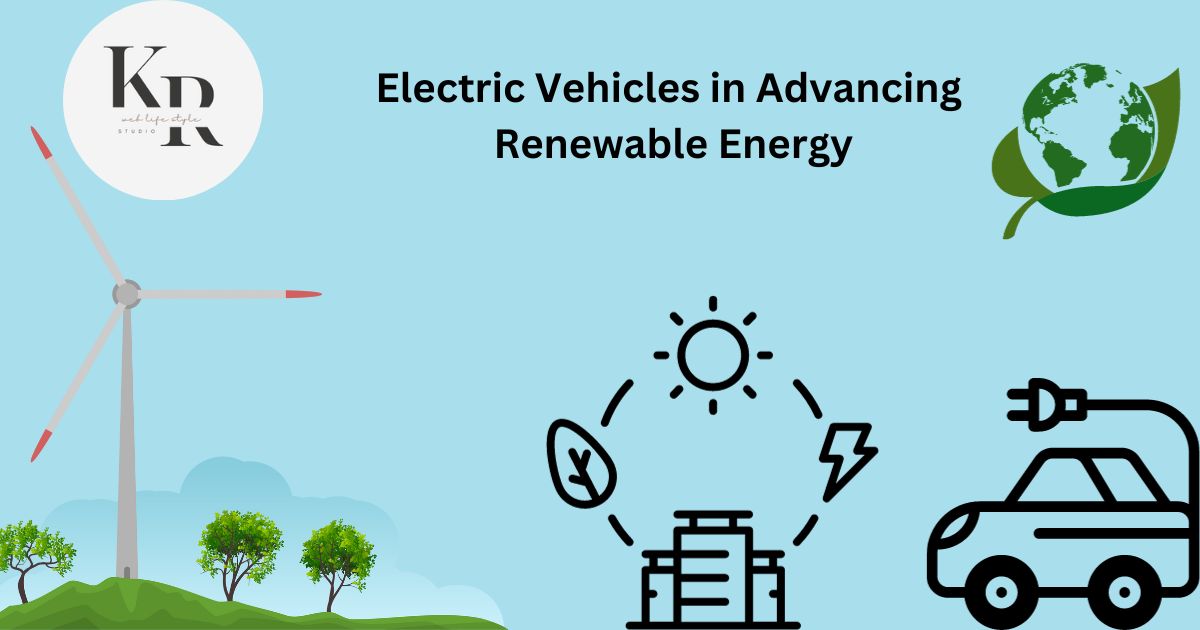The Significance of Electric Vehicles in Advancing Renewable Energy
Amidst an epoch characterized by a global pivot towards sustainability, the pivotal role played by electric vehicles (EVs) in advancing the cause of renewable energy assumes an increasingly conspicuous posture. These EVs not only proffer a more environmentally conscientious substitute to their petrol-driven counterparts but also wield the potential to revamp the landscape of renewable energy generation, storage, and dissemination. In the ensuing discussion, we shall plumb the virtues of electric vehicles, their seamless assimilation into renewable energy frameworks, the impediments strewn along their trajectory, and the prospects that beckon this burgeoning technology. Electric vehicles (EVs) have materialized as a potent and influential entity within the realm of transportation, offering an ecologically considerate and sustainable departure from conventional gasoline-propelled conveyances. Unlike their fossil-fueled analogs, EVs draw their vitality from stored electricity in rechargeable cells, obviating the reliance on fossil fuels and concurrently mitigating the discharge of noxious emissions.

Advantages of Electric Vehicles
- Minimized Carbon Emissions: Electric vehicles emit no tailpipe pollutants, thus constituting a potent weapon against the menace of greenhouse gas emissions and the looming specter of climate change. Transitioning from gasoline to electric propulsion has the potential to drastically curtail our carbon footprint.
- Enhanced Air Quality: The absence of tailpipe emissions from electric vehicles translates into purer air, a reduction in urban air pollution, and subsequent gains in public health and environmental well-being.
- Augmented Energy Efficiency: Electric vehicles outstrip their internal combustion engine counterparts in energy efficiency. While conventional automobiles squander a substantial portion of energy through wasteful heat dissipation, EVs maximize their battery energy conversion into actual propulsion, rendering them more efficient and cost-effective.
- Energy Sovereignty: Electric vehicles herald an opportunity to reduce reliance on finite fossil fuel reserves. By harnessing renewable energy sources to power EVs, nations can bolster their energy independence and reduce susceptibility to the vagaries of oil prices and supply fluctuations.
- Noise Abatement: Electric vehicles operate with considerably less acoustic commotion than traditional vehicles, thus ameliorating noise pollution in densely inhabited areas and elevating the overall quality of life in urban settings.
The Confluence of Electric Vehicles and Renewable Energy
Electric vehicles harbor the potential to become an indispensable component of the renewable energy ecosystem, serving as both energy storage units and dynamic contributors to energy supply. Herein lie several avenues for the seamless amalgamation of EVs with renewable energy:
- Vehicle-to-Grid (V2G) Technology: V2G technology empowers electric vehicles not merely to consume energy but also to contribute energy back to the grid. EVs can stockpile surplus renewable energy and channel it back to the grid during peak demand periods, effectively metamorphosing into mobile energy reservoirs.
- Astute Charging Infrastructure: The implementation of astute charging infrastructure, intricately synchronized with renewable energy generation, can optimize the utilization of electricity from green sources. This ensures that EVs are replenished when renewable energy abounds, thus maximizing the utilization of pristine energy.
- Charging Stations Fueled by Renewable Energy: The installation of charging stations energized by renewable sources like solar or wind further fosters the utilization of clean energy within the transportation sector. These charging hubs constitute an invaluable contribution to the creation of a sustainable charging infrastructure for electric vehicles.
- Integration with Intelligent Grids: Electric vehicles can be seamlessly woven into intelligent grid systems, enabling bidirectional communication between EVs and the grid. This fosters superior coordination and management of energy assets, ensuring the efficient and reliable distribution of renewable energy to fuel EVs.
Obstacles and Remedies
Despite the manifold merits, the universal adoption of electric vehicles and their harmonious integration with renewable energy grids encounter a gamut of challenges. These challenges encompass:
- Sparse Charging Infrastructure: The scarcity of charging stations stands as a pivotal impediment to the widespread embrace of EVs. To surmount this hurdle, both governmental bodies and private enterprises must invest in erecting a robust charging infrastructure replete with public and private charging points, conveniently distributed.
- Range Apprehension: The specter of range anxiety, which denotes the fear of battery depletion mid-journey, looms large. Addressing this disquiet necessitates innovations in battery technology, culminating in augmented driving ranges and expeditious recharging.
- Elevated Initial Costs: Electric vehicles typically command a higher price point than their conventional counterparts. However, as technology advances and economies of scale manifest, the cost of EVs is poised to decline. Financial incentives and subsidies can further broaden the accessibility of electric vehicles to a broader spectrum of consumers.
- Grid Sturdiness: The integration of a substantial number of electric vehicles into the grid may pose challenges to grid stability, particularly during peak charging periods. Prudent charging strategies and load management systems can mitigate these concerns by optimizing charging schedules and aligning them with renewable energy generation.
- Battery Reclamation and Disposal: The proper recycling and disposal of EV batteries pose environmental conundrums. Establishing a robust recycling infrastructure and enforcing regulations for responsible battery disposal constitute imperative measures to sustain the eco-friendliness of electric vehicles.
Prospects on the Horizon
The future trajectory of electric vehicles in advancing renewable energy radiates promise. Ongoing strides in battery technology are assuaging concerns regarding range anxiety by expanding driving ranges and hastening recharge times. Governments worldwide are proactively embarking on initiatives to incentivize electric vehicle adoption and infuse fresh vigor into renewable energy infrastructure. As the embrace of electric vehicles amplifies, the appetite for renewable energy sources burgeons in tandem. This symbiotic relationship is poised to galvanize the development of renewable energy technologies and reinforce the imperatives of a cleaner, more sustainable energy future.
In summation, electric vehicles assume a pivotal role in the advancement of renewable energy, as they contribute to a reduction in carbon emissions, an enhancement of air quality, and the promotion of energy efficiency. Their seamless integration into renewable energy systems begets a mutually beneficial relationship that augments both the transportation sector and the renewable energy sector. Overcoming challenges such as the paucity of charging infrastructure and the conundrum of battery disposal necessitates concerted efforts on the part of governments, industry stakeholders, and consumers. As we progress into the future, electric vehicles shall steadfastly steer us towards a greener, more sustainable tomorrow. In conclusion, electric vehicles are catalyzing a revolution in the renewable energy sector, dramatically curtailing carbon emissions, propelling the growth of renewable energy sources, and reshaping the transportation landscape. With improvements in charging infrastructure, advancements in battery technology, and proactive government policies, a future beckons where electric vehicles take center stage in the realization of a sustainable, decarbonized energy paradigm.
To read more about Electric Vehicles and Renewable Energy visit
To learn more about Technology news Click Here






